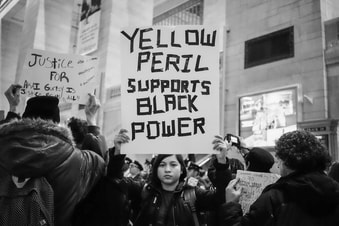 For the final day of Asian American Pacific Islander Appreciation month, I'd like to talk once more about the importance of Asian-Americans supporting our black communities in their times of need. It's crucial that we continue to educate the world on why the Black Lives Matter movement is so important and relevant, no matter what race you are. - The Asian American Movement has been relatively recent, considering the immigration of Asians into the United States only really began in the late 1800s. However, the history of oppression of black people dates all the way back to the 1600s, to the roots of slavery. The path for the Asian American Movement was paved by the Black Power Movement and much of the achievements and legislation from that movement has also provided Asian Americans with the increased rights we have today. The Civil Rights Movement especially, was a time in history mostly associated with the Black Power Movement led by Martin Luther King Jr. However, this legislation has transcended that movement and aimed to provide rights to all races in the United States. As an Asian, I've noticed that in our community, there is an inherent racism towards black people that is taught to us from an early age. It's like there's this constant concept of a competition between minorities, and this constant thought "who deserves it more". Honestly what the hell is that. It's the "model minority complex" that has driven a wedge between blacks and Asian Americans. For those of you who aren't really clear on what that is, it's a corrupted perception that Asian-Americans are all successful. In reality, it's an excuse made by white America to downplay the struggles of other minorities by saying "they can do it despite the racism they face, why can't you?" Not only does this absolutely disregard the more intense racism black communities have faced throughout America, it also makes the generalization that all Asian-Americans are successful and rich. I recently did research for a new DeclarASIAN project that looked into the statistics on Asian-American income and poverty levels and the data was shocking. (Check it out here.) For example, it showed that 38.7% of Hmong Americans live under the poverty line as compared to the 12% of all Asian Americans that live under the poverty line. That's insane. So why are Asian-Americans generalized into this "model minority" category? Because having this argument allows for white America to avoid taking responsibility to address racial discrimination and consequential damage. Arguments like "all Asian families have two parent households and a steady income and that's why they're successful" are simply overlooking the other factors that play into success and minimizing the role that racism plays in the struggles minorities face. Maybe black families can't afford to stay together and get a steady job because of the racism that is deeply embedded in America. For generations, what has linked minorities has not only been our similar struggles through oppression, but also our goals in the end. Goals of equality and freedom for all. I wrote a history lesson on Yuri Kochiyama a while back, and what amazed me the most about all her accomplishments was her commitment towards creating unity between the Asian and Black communities. She had described the impact of Malcolm X on the Asian American Movement, how he advocated for all minorities to have self-determination, and how he promoted learning about each others' cultures and history. She tried to emphasize that we are all fighting the same battle in the end, and together we are more powerful. 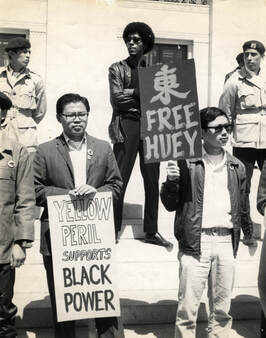 It's so frustrating how our society seems to be moving backwards, as Asian Americans--even some around me--still look down on blacks and downplay their struggles. We too, have faced those struggles. We too, have had those goals. We too, strive for justice. So I urge the Asian American and Black communities to come together in this crisis and support each other. By becoming part of the movement, we are giving our support to people in need. If we do not speak up for the black community and demand justice for them, we are just as guilty as the officers who killed innocent black people. By staying silent, we turn a blind eye like America has done for generations to the struggles that the black community in America has faced. So don't turn a blind eye. Don't stay silent. Support the black community in their time of need, like they have done for us. Author: Carina Sun
0 Comments
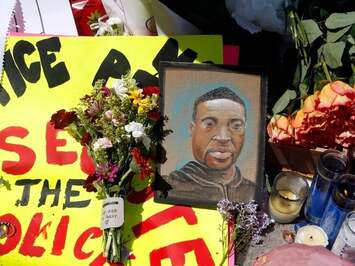 DeclarASIAN is a platform that advocates for Asian and Asian-American empowerment. However, I think it’s crucial to speak up for other minorities when they face extreme injustice. Today’s “AAPI Heritage Appreciation Month” Lesson is replaced with something I think more people need to not only know about but speak up about. On May 25, 2020, a black man named George Floyd was handcuffed and pinned down by a police officer. The police officer, Officer Derek Chauvin, used his knee to pin Floyd’s neck to the ground. Chauvin, a white male officer, could hear Floyd’s pleas for him to lift his knee. In bystander video footage, Floyd can be heard pleading, “Please, please, please, I can’t breathe. My stomach hurts. My neck hurts. Please. Please, I can’t breathe. You're going to kill me.” This footage was extremely difficult to watch, as Chauvin ignored Floyd’s breathless pleas for help. New footage obtained shows that he wasn’t resisting arrest like Chauvin claimed. He wasn’t violently acting out. He was simply begging for his life. There were three other officers with Chauvin as he murdered George Floyd. One of them was an Asian-American officer, Tou Thao. While I recognize there was another officer, as an Asian-American empowerment platform, I feel like it’s dire to address the inappropriate and despicable actions of Thao. Although he didn’t physically kill Floyd, he was just a part of his death as Chauvin. He stood by and watched and did nothing. Upon further research, it turns out that Thao has had a spotty career. He was laid off at the Minneapolis Police Department in 2010, then returned in 2012. It’s also now revealed that during his time as an officer, 6 complaints were filed against Thao, and in 2017, he was sued by Lamar Ferguson for using excessive force during an arrest, including punching, beating, and kicking. 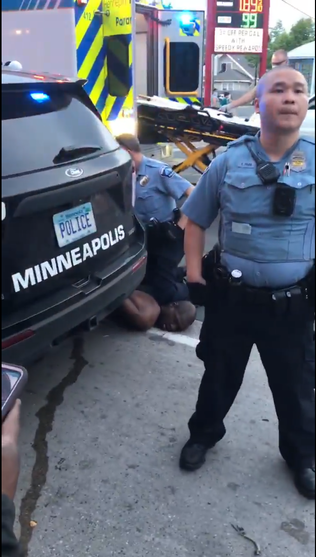 By-stander footage of Tou Thao and Derek Chauvin. By-stander footage of Tou Thao and Derek Chauvin. It disgusts me that Thao didn’t stand up for Floyd’s life. As a minority, it doesn’t matter whether you’re black or Chinese or Indian or Hispanic. You need to stand up for one another against mistreatment especially when it stems from racism and discrimination. (By the way, Ferguson’s brutal attack didn’t make any headlines when it happened. Why? I guess because he didn’t die. And I guess that’s what it takes to get people to pay attention nowadays. Death. ) And yet, even that doesn’t seem to change the deep-rooted racism that runs through this country. In 2014, Eric Garner was held in a chokehold by a white, male New York Police Officer and killed. The officer in charge of his death wasn’t fired until late 2019. The way it unfolded, and the protests of Garner’s death were almost the exact same as the ones now. How many deaths will it take, how many protests, until things change? I wrote an article a few days ago about police brutality with Asian-Americans and other minorities throughout history. Never did I think that something like this would happen just a few days later to a black man. But should I have? It makes me sick to say that in America, this type of incident is almost the new norm. It happens so often that unless media attention is given to it (which is rare) or someone dies, people turn a blank eye to it. There’s so much racism and violence embedded in the United States that even as things seem to be progressing, we haven’t even started to scratch the tip of the iceberg. George Floyd’s life mattered. It mattered as much as Eric Garner’s, as much as mine or yours or the life of literally any other person. And every other life taken by this awful human construct of racism will matter. Rest in Peace, George Floyd, Eric Garner, Michael Brown, Tamir Rice, Freddie Gray, Sandra Bland, John Crawford, Alton Sterling, Walter Scott, Oscar Grant, Clifford Glover, Sean Bell, Akai Gurley, Ezell Ford, Kelly Thomas, Jamar Clark, Antonio Martin, and so many others. Author: Carina Sun  From the thousands of Asian activism pages online, @asian.actiivist stands out as one of the most influential. This page was started by 16-year-old Yilan Batista, A Cuban-Chinese activist who is raising awareness about Asian rights. With over 46.6k followers on Instagram, her content educates others about modern issues surrounding Asian rights, politics, and struggles. We had the pleasure of interviewing her and learning a little about what inspired such a passion for activism. 1. How have your family/traditions impacted the way you are today? "Both my families from my mother and father's side have struggled with histories of capitalism and communism in their respective countries, China and Cuba. When you come from families that were impacted in communist revolutions, it's easy to fall for red scare American propaganda that seeks to demonize socialist countries as authoritarian and backwards. 2. Have you ever faced discrimination before? How did it alter your perspective and and how were you able to begin accepting and loving your culture? "I've faced the type of discrimination that many Asians face - being called slurs, being told to go back to my country, etc. However, the most powerful racism that I faced was internalized racism. Growing up in China, I believed I would never be enough because I was not white or American. I believed I could only be happy if I came to America. When I finally came to America in 2017, my perspective shifted greatly. I realized how much China meant to me -- it was my home. I also realized how I could never be white or American, no matter how much I hoped I could. 4. What is your advice for young Asian-Americans struggling with accepting their own cultures? "So many young Asian Americans struggle with their cultures because white America actively portrays them as backward and disgusting. 5. Why is Asian-American pride activism important to you? "Asian American pride and activism is important to me because the struggles that Asian Americans face are often erased in mainstream media, and mainstream media is also constantly pushing red scare, yellow peril propaganda against our native countries. Thank you so much, Yilan, for sharing your own experiences and continuing to inspire others to embrace their cultures in the face of racism. It's especially important now to speak out against racial stereotyping and educate others on Asian history and culture.
Check out her Instagram page here: @asian.actiivist Interviewer: Carina Sun Interviewee: Yilan Batista Wow, I can't believe it's already May. These past two months in quarantine have gone by in the blink of an eye, but here at DeclarASIAN, we hope that everyone is finding productive ways to get through this chaotic period.
More than ever, it's important to realize that this month is Asian Heritage Month--a month dedicated to celebrating and recognizing the important impact that Asians and Pacific Islanders have had in the United States. This year, it also commemorates the 151st anniversary of the completion of the first transcontinental railroad, mainly constructed by Chinese migrants. Unfortunately, many of the usual celebrations such as APA Heritage festivals and parades have been cancelled this year, a year where instead of being able to embrace and recognize their heritage, AAPI persons are being blatantly attacked and harassed. This will be an Asian Heritage Month unlike any other. Usually, Chinese restaurants would be packed with customers ready to enjoy various dishes, but this year, these same restaurants are on the verge of bankruptcy. For example, Philadelphia Chinatown was set to host a bounty of festivities to celebrate this year, only to have more than 95% of Chinese-owned businesses shutting down during the pandemic. A month dedicated to celebrating the contributions of Asians and Pacific Islanders to the United States has been tarnished and polluted by a wave of racism and xenophobia that is tearing the country apart. To show what Asian Heritage Month really stands for, DeclarASIAN will be highlighting one significant contribution by Asian-Americans to the United States every day of May. Whether it be about an influential Asian-American leader like Fred Korematsu or the history of Chinese immigrants, learning about the positive impacts that Asian-Americans have and continue to make in America is the first step in silencing racist and xenophobic attacks that are rooted in false, uneducated accusations. Author: Carina Sun  Image courtesy of "the Collider". Image courtesy of "the Collider". If you haven't seen it yet, go watch "The Half of It" on Netflix. It's not only an amazing cinematic rollercoaster, but the first film directed by an Asian-American woman to win the Founder's Award for Best Narrative Feature. This incredible director is Alice Wu. Her debut movie was Saving Face, another movie with a focus on Asian-American culture. I haven't had the chance to watch that film yet, but I am planning on it! I'm here to talk about her latest film, "The Half of It". It's a transcendental film following the life of Ellie Chu, a teenage Chinese-American living in small-town America. Not only does it address important issues of Asian-immigrants and racism, it also addresses the LGBTQ community and follows Ellie as she grows into herself. It's difficult to fit so many deep and important messages into a runtime of 1 hour and 44 minutes, but Wu manages to do so impeccably. This isn't a movie review though, this is a post focusing on the importance of films like "The Half of It" in today's culture. Discrimination goes far beyond high school bullying, which happens to Ellie in the film, as classmates make fun of her last name. Then we are introduced to her family situation as the film progresses. Her father, an immigrant with multiple degrees from China is unable to find a job in America because of a language barrier. And because of that, his degrees are deemed practically useless, and he is only able to find a job at a rundown train station. In the beginning of the film, Ellie asks her father if he has called the electric company, and he replies dejectedly that they do not understand him. This is a problem that many Asian-American immigrants face. The language barrier, which is propelled by racism and inherent discrimination against Asians. In our world, when all you see is color, a person's status, education, and background are deemed unimportant in comparison. Like in the film, people are impatient. I have personally experienced my mother being discriminated and insulted because she has broken english--which she has learned extremely well considering she only moved to America when she had me. This is something that has to change. Because of this inherent discrimination inside of people, many educated, intelligent immigrants are even not given job opportunities in America, and that is the cause of high rates of Asian-American poverty in cities like San Fransisco and New York City, where you see elderly Asian-American immigrants struggling to earn their next meal by picking up street litter. - There are organizations that aim to provide language resources and other services to help Asian-American immigrants gain access to education, job opportunities, and home services. Recently, I spoke to the research director of the Asian American Federation, a non-profit based in New York City fighting for Asian-American immigrants to have more opportunities. Read about our interview here. As a child of immigrants who struggled through these same obstacles, I am truly grateful to my parents for giving me the opportunities that I now have. So since Mother's Day is coming up, and I encourage you--if you are a child of an immigrant--to thank your mother (and your father!) for the sacrifices they've made for you. Let them know that you don't take anything for granted, because they have given you everything. Author: Carina Sun |
|

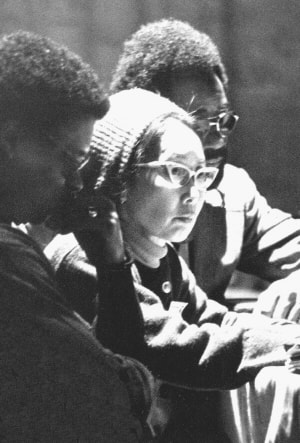
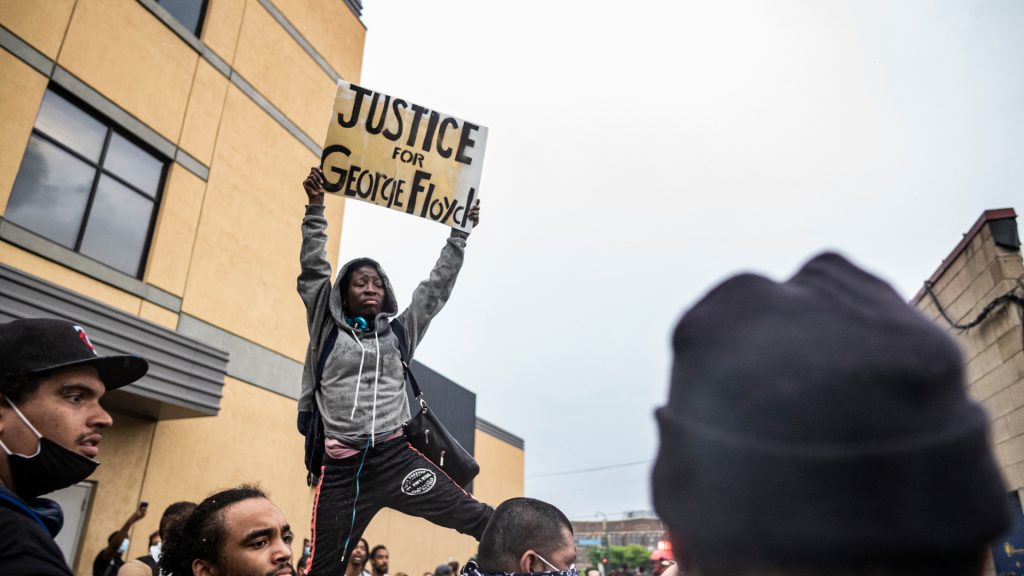
 RSS Feed
RSS Feed